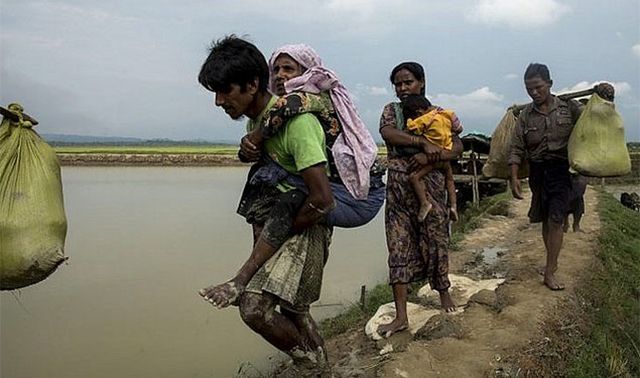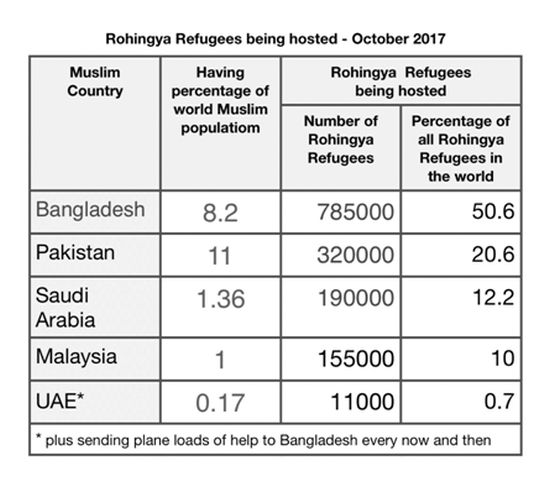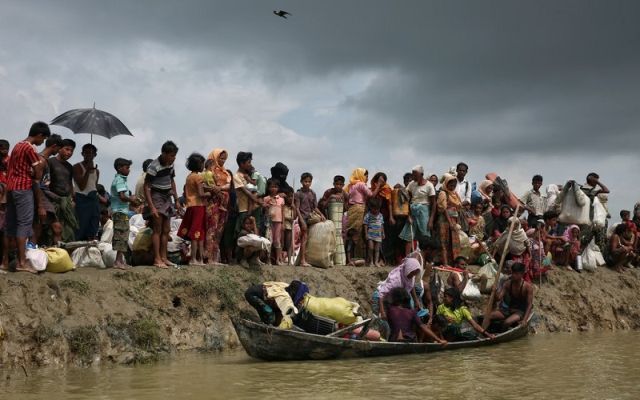
by admin | May 25, 2021 | World
 By Arul Louis,
By Arul Louis,
United Nations : Describing the Rohingya refugee situation as one of the worst humanitarian and human rights crises of the past year, Secretary-General Antonio Guterres has called for international action to ensure Myanmar is held to account for the crimes of its security forces.
Speaking at a Security Council session convened on Tuesday for the one-year anniversary of the start of the exodus of 720,000 Rohingyas to Bangladesh, Guterres also condemned the attacks by extremists against the security forces.
However, he added that nothing can ever justify the disproportionate use of force against civilians and the horrendous violation of human rights violations by the security forces.
Urging united action by the divided Security Council, Guterres cited a report issued on Monday by a UN Human Rights Council (UNHRC) fact-finding team and said the human rights abuses amounted to “the gravest crimes under international law”.
He thanked the Bangladesh government for its generosity in hosting the refugees and said more needs to be done by the world community as only 33 per cent of the $951 million UN appeal for assistance has been met and the the monsoon season looms.
The current crisis began in August 2017 with attacks on Myanmar security posts by the Arakan Rohingya Salvation Army (ARSA), which is led by Karachi-born Ata Ullah.
The Myanmar armed forces and vigilantes retaliated brutally against the Rohingyas starting an exodus that began on August 25.
Tariq Mahmood Ahmad, the British Minister of State for the UN, who presided over the Security Council session, said that it should be prepared to use all the tools it has to ensure justice for the Rohingyas.
The strongly-worded report by the UNHRC team headed by former Indonesian attorney-general Marzuki Darusman said that allegations of genocide against Myanmar officials should be referred to the International Criminal Court (ICC) or to a special tribunal.
The Netherlands and Sweden backed the suggestion and asked the Security Council to refer the matter to the ICC.
But Russia and China countered saying that the situation required a non-confrontational approach and only a bilateral diplomatic solution involving Myanmar and Bangladesh would work.
Myanmar’s Permanent Representative Hau Do Suan said that his country did not accept the findings of the UNHRC team as it was biased.
However, he added that Myanmar does not condone human rights abuses and would take action against anyone guilty if there was evidence of their conduct.
He alleged that the ARSA had set up terrorist bases in some areas along the border with Bangladesh.
Bangladesh Permanent Representative Masud Bin Momen said that in the light of the UNHRC team’s report, it was imperative that the Security Council should act decisively.
He said that the Rohingyas could not return to their homes in Rakhine state unless they were assured of their safety.
For this, the Myanmar government should take several steps like curbing hate speech, allowing free access to UN agencies for relief operations and dismantling internal camps for Rohingyas and giving them freedom of movement.
Australian-born actor Cate Blanchett, who is a Goodwill Ambassador for the UN High Commissioner for Refugees, spoke at the Security Council session about her encounters with Rohingya refugees who told her harrowing tales of their experiences in Myanmar.
She said that as a mother she was moved by the plight of the children she met as she saw her children reflected in them.
(Arul Louis can be reached at arul.l@ians.in)
—IANS

by admin | May 25, 2021 | Opinions
 Dr Syed Zafar Mahmood,
Dr Syed Zafar Mahmood,
The New York Declaration on Refugees & Migrants was unanimously adopted by the UN General Assembly on 19 Sept 2016. From India it was attended by VK Singh, Minister of State for External Affairs. Through this Declaration the world, in one voice, expressed the joint political will of all the 193 member states of UN General Assembly, who made a historic commitment to more equitably share responsibility for the world’s refugees and migrants. They made a determination, inter alia, to protect the human rights of all refugees and migrants – regardless of status, to ensure education for all refugee and migrant children within a few months of their arrival and to support the countries rescuing, receiving and hosting large numbers of refugees and migrants.
2. That way a Comprehensive Refugee Response Framework (CRRF) was adopted pleading to help the refugees to thrive, not just survive, thus reducing the risk of protracted stays and lessen the refugees’ dependence on humanitarian aid.
3. This Framework reaffirms that the human conscience is made by God and that’s why, irrespective of noises in some nation states driven by short term political axes to grind, the concern for human interests have broadly prevailed. India’s foreign minister Sushma Swaraj did pack off to Bangladesh a plane load of materials to address part of the basic necessities of Rohingya lives even though her party has taken a patently anti-Rohingya stand on the ab initio flimsy ground that all Rohingyas have potential to be terrorists.
4. On the other hand, implementing the CRRF spirit in its national laws, Djibouti passed a new national refugee law in January 2017 enabling its government to issue for the refugees official identification documentation, giving them better access to education and health services, right to work, access the justice system, quality education and the right to naturalization. In Ethiopia, the refugee children will now be issued birth certificates.
5. The geopolitical secret of the Rakhine state of Myanmar is by now open in the public realm. It is virtually ‘Asia’s ocean frontier’, the country is flanked by China and India with their respective long & short term interests deeply embedded in the Burmese topography and whereabouts.
6. In India, these days in TV debates, some persons ask as to why Muslim countries are not hosting the Rohingya Refugees. In this regard the following table is worth noticing:
It shows that many Muslim countries are discharging much more than their proportionate responsibility, to help out the Rohingyas.
7. Talking of the world’s best practices in treating the Refugees, it’s satisfying to know that Uganda is giving them even land to build home and to cultivate. The World Bank has granted US$2bn under IDA-18 for providing funds for developmental activities to the low income ‘refugee hosting countries’.

8. The European International Development Cooperation (DEVCO) and Japan International Cooperation Agency (JICA) are giving increasing support to the refugee hosting countries so that they can further include refugees in national development plans.
9. The UNGA has given a call for bringing together the UNHCR, governments, NGOs and the private sector and, crucially, the refugees themselves, to help them become self-reliant and contribute to their host communities’ development.
10. In India, some Rohingya Refugees have petitioned the Supreme Court asking for equal treatment like other and larger refugee communities like from Tibet and Sri Lanka. They say that if any person is found to be indulging in any anti-national activities, in that case, the law should take its course to hand out harsh punishment; but, for one black sheep the entire group should not be herded back into the jaws of Burmese anti-Rohingya atrocities that are well known to the world threatening the Rohingya lives and freedom.
11. India’s National Commission of Human Rights has also put on notice the ministry of home affairs and may intervene in the ongoing Supreme Court case in defense of Rohingyas. The UN Human Rights Commission too has appealed to India to respect the international law of non-refoulement.
12. In any case, so far, the Government of Myanmar has not announced any special concession exclusively favoring India saying that would they accept back the Rohingyas (currently in India) as Myanmarese citizens. Yet, it goes without saying, while living here in India, all the Refugees are bound to fully obey and respect the Indian law and our cultural traditions.
(Dr Syed Zafar Mahmood, President, zakatindia.org)

by admin | May 25, 2021 | Muslim World
 Geneva : The refugee crisis engulfing Myanmar and neighboring Bangladesh is far larger than previously believed, according to the latest data released by UN agencies on Friday in Geneva.
Geneva : The refugee crisis engulfing Myanmar and neighboring Bangladesh is far larger than previously believed, according to the latest data released by UN agencies on Friday in Geneva.
An estimated 270,000 million Rohingya Muslims have fled the deadly violence in Myanmar’s Rakhine state and have arrived in neighboring Bangladesh over the past two weeks, the UN Refugee Agency (UNHCR) and the International Organization for Migration (IOM) said.
The number jumped more than 100,000 above the previous estimate because many arrivals are camping along roads and fields, and aid groups only got a clearer picture of the situation over the past few days, UNHCR spokeswoman Duniya Aslam Khan told a press conference.
IOM spokesman Leonard Doyle added that there was a sharp increase in arrivals on Wednesday, as at least 300 boats arrived in the Bangladeshi fishing port of Cox’s Bazar.
Members of the persecuted Rohingya minority have been fleeing since violence erupted in western Myanmar’s Rakhine state nearly two weeks ago.
Myanmar’s army has launched what it calls a “clearance operation” after Rohingya insurgents attacked police posts and military bases in Rakhine, home to more than 1 million Muslims in Buddhist-majority Myanmar.
Those who arrived in Bangladesh claim that security forces have killed civilians, burned their homes and driven them away from Rakhine.
Most of the refugees are trekking through the jungle and mountains for days to reach Bangladesh, but there are thousands of others who take the dangerous sea route across the Bay of Bengal.
“Most of the people now crossing the border are women, children and the elderly, many of whom are vulnerable and lack the ability to take care of themselves,” Doyle said.
UNHCR demanded that the root causes of the recent violence be addressed urgently.
—AG/IINA




